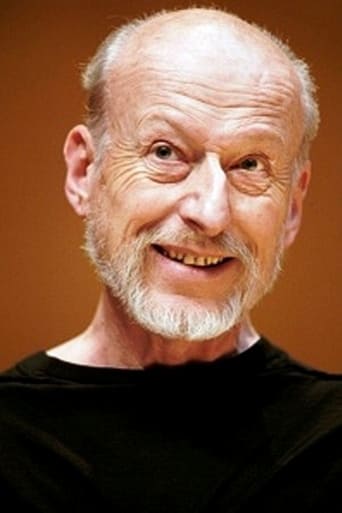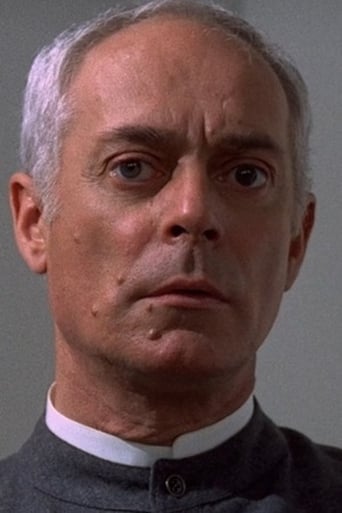Teringer
An Exercise In Nonsense
Kidskycom
It's funny watching the elements come together in this complicated scam. On one hand, the set-up isn't quite as complex as it seems, but there's an easy sense of fun in every exchange.
Casey Duggan
It’s sentimental, ridiculously long and only occasionally funny
Geraldine
The story, direction, characters, and writing/dialogue is akin to taking a tranquilizer shot to the neck, but everything else was so well done.
Edgar Soberon Torchia
I do not know if I am delirious, but living in a country that has an enclave called the Vatican (in a certain way, a spiritual "Canal Zone", as the area under US control within Panamá) must predispose Italian artists: perhaps it leads the most pious to exalt Catholicism, while the most progressive maybe take a more critical stance towards this ecclesiastical-state enterprise within their country. I find quite curious that two Italian non-believers and filmmakers, one Marxist and the other atheist, made two of the most interesting films I have seen about the figure of Jesus of Nazareth. First, Pier Paolo Pasolini, released in 1964 «The Gospel According to Matthew», in the middle of a controversy that ended in praise; and the other, Roberto Rossellini presented «The Messia» in 1975 with less luck, to the point that the free circulation of the product had to wait almost 30 years to be (marginally) distributed. «The Messiah» is long, Brechtian, austere and intelligent; it dispenses with many biblical passages in which David W. Griffith, Miguel Morayta, Nicholas Ray, George Stevens, Franco Zeffirelli, Martin Scorsese or Mel Gibson delighted in their (kind of frivolous) versions of the Nazarene's immolation; and it introduces the story in an ingenious way: the film starts with a synthesis of the history of the Jewish people, from their arrival to the "promised land", after 40 years in the desert, to the selection of Saul as their first king, who led the common man to war, and proceeds with a description of the process of corruption to which the tribes came, which culminates in the moment when the expected Messiah appeared, to whom they ended up turning their backs and murdering. Rossellini does not shilly- shally: he cleverly exposes the political intrigue of Pharisees and Jewish priests, who try to preserve their power without disturbing the Roman invaders that control them. Jesus is young and strong, somewhat timid, he works wood, ploughs and gleans, has mystical outbursts, preaches with metaphors to death, and knows how to debate with logical reasoning. The most difficult part of the film is the sequence of the apostles' proselytizing campaign, as they preach the "new word", but that is the director's choice. Rossellini prefers that to show us instead the brutal and violent, in the best aesthetic line of a Greek tragedy, which showed not tortures, crimes or mutilations on stage. «The Messiah» saves us the lashes, the road to Golgotha, the long agony on the cross, and the miracles. The agenda of the film is another: it is to show the story of a man who confronted the corruption of power, who preached love as method, but who was paid with hatred by his own people. The way Rossellini does it is realistic, he shows thing in a way so natural and non-dramatized (often in long shots, with few cuts or none), that the images lose that false fervor of "saint cards" that has ruined so many films about Jesus. As an example, see the sequence of the last supper, from the moment Jesus washes the apostles' feet to Judas' departure. It is just that, a last meal, a sad farewell and the leader's final instructions, and not an ornate evocation of the first Eucharist. Roberto Rossellini was not an improvised filmmaker: he is the father of Italian neo- realism, a brilliant light in the history of cinema, whose trilogy of war («Rome, Open City», «Paisá» and «Germany, Year Zero») marked the birth of contemporary cinema. He was an innovator who took melodrama to the limit in his films with Ingrid Bergman, the love of his life, in «Stromboli, Land of God,» «Europe 51» or «Voyage to Italy,» and a visionary who joined the practice of television, a medium that he glimpsed as the audiovisual future of the planet. «The Messiah» is not a sole spiritual work in his oeuvre. It also includes the portrait of Francis of Assisi in his film «Francesco, Jester of God» (1950) and the TV mini-series «Acts of the Apostles» (1969). Atheists can also be sensitive to genuine religious people.
tieman64
Released several years after his death, Roberto Rossellini's "The Messiah" is arguably one of the two most interesting films made about Jesus Christ, the other being Pier Paolo Pasolini's "The Gospel According to St. Matthew" , which paints Christ as a proto-Marxist and radical, social activist.Oddly, though Rossellini made many excellent "spiritual films" - see "The Flowers of St Francis" - the tone of "The Messiah" is closer to his 1971 film "Socrates" and his 1972 film "Blaise Pascal", Rossellini (an atheist) painting Christ as a quiet man of logic and reason.And so Rossillini's film is less about "the messiah" than it is about people whose needs for "a messiah" are so strong that they project godhood upon a Jesus Christ that is held at a distance and treated almost as a cipher. As such, Rossillini portrays Christ as a mild, almost timid rabbi, the most ordinary, quiet and uninspiring teacher imaginable. His Jesus, like Bresson's Joan of Arc, despite being immensely curious, also seems to want to disappear into obscurity.Of course, upon this blank slate Rossillini then shows a slew of followers blindly projecting their burdens, wants and needs. Rossellini's Christ is a resonant tabula rasa, and it is ultimately others who turn him into the son of God.In this regard, the followers of Jesus are turned into a subtle parody of irrationality, whilst those naysayers whom films typically show lambasting Christ as a conman and charlatan, are shown to be simply reacting against illogical, scripture twisting "Christians" who are, at worst, a civilly disruptive phenomenon, at best, a harmless bunch of simpletons.Christ is such a cipher in this film that, even on the cross, Rossillini chooses to leave out those iconic bits of Biblical dialogue which we're all familiar with ("Forgive them, Father, for they know not what they do!", "My Father, why hast Thou forsaken me?" etc). Instead, Christ just hangs there, a provocative question mark.Which is not to say that the film mocks Christians. No, Rossellini is up to something else. His film downplays the New Testament's miracles and more supernatural elements, and portrays Christs followers, both as a race and social class, as being abandoned, adrift, perpetually persecuted, direction-less and without a unifying leader. So hungry are they for direction and justice, that they almost conjure Christ himself out of the desert sands. He, they decide, will stand for them. In this regard the film draws parallels with Rossellini's Socrates, who is abused by an Athenian "democracy" which persecutes intellectuals, humanists and educators (intellectuals are similarly summoned and slain in "The Messiah"). The animosity directed towards Christ and Socrates then becomes a metaphor for the growing animosity toward social justice and critical thinking in both totalitarian and democratic societies, both of which are preoccupied with power, profit and so afraid of autonomy, knowledge and education. This, of course, echoes Rossellini's own life under Mussolini and post-fascism.So again we have Christ the liberator, not sent, but hungered for by a people who wish to be liberated from the despotic rule of a wealthy minority. Christ's murder then becomes the execution of a people's very dream for liberation. The film's last shot focuses on a sad, strangely empty sky. Christianity as an existential, even social project, dies here, and henceforth becomes a religious cult. Pessimistically, social justice is seen to be attainable in the area of values/beliefs/hopes etc, but not in the realm of real life. 8/10 - Worth one viewing.
ian-ternik
THE MESSIAS is one of the best Jesus-Movies ever. It is not a big budget production like Mel Gibsons nightmare of it or Scorseses movie. Rossellinis film is reduced to one point. There are no action-scenes, no gore or blood - it is the spoke word which contains the high concentration of this special movie work. Minimalisem. The story of Jesus is taken from the bible, the dialogs are near to the holy word. The camera-work is only a long-shoot. It looks like the typical work of the Italian cameramen for the spaghetti-western...but in THE MESSIAS is the camera-work a brilliant long-shoot work, inspired by the icon-painters. Some people don't like this wonderful movie because they felt bored. The reason is maybe the high concentrated work of the director. He always get the scenes to one minimalism point. The actors are great, especially the actor of Jesus. But be warned: There is no big scene, no action! The cast has only a few extras but 80 scenes. And my favorite scene is when Jesus meets Johannes the baptist and there is only one sentence spoken - the first for the Jesus-character in this movie.This is a good, very fantastic moment, a really great for the movie. Here you can feel the consequence of the perfect work Rossellinis. And his true work to the bible without any pathos! It is maybe the best Jesus movie ever. The movie tells from the WORD and the message is the deep love to the mankind.
DivineComedy
This is an incredible movie, and for many reasons. No one in Hollywood could make such a low-key, authentic, and INTELLIGENT historic drama, especially considering subject matter. The first 20 minutes is a concise and brilliant history of the Jews. And then the life: It is the life of Jesus without the miracles. Like the priest in Open City (by Rossellini), R understands that the struggle is to live a good life. Most Biblical movies are a total insult. This is extraordinary. The actors are believable. It feels raw -- but controlled raw, if that makes sense. Again: authentic. Believable.




